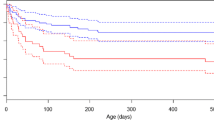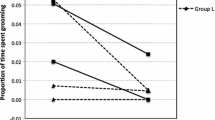Abstract
Callitrichids are small Neotropical primates and, due to their cooperative breeding system, infants are of particular interest in research on social dynamics. Although a few studies have investigated the role of helpers in this type of system, there is still a lack of research in field studies seeking to determine whether there is a relationship between the number of helpers (adults) in a social group and the motor development of infants. With that in mind, four groups of wild marmosets (Callithrix jacchus) were observed and the motor behaviors of 1 to 4 month-old infants were recorded. To investigate the influence of the adult:infant ratio on motor diversity, used as an indicator of motor development, we ran a GLMM with a Gaussian distribution and found that: (i) in groups with fewer adults, 2-month-old infants show earlier motor diversity; (ii) motor diversity increases with age regardless of the ratio of adult males per infant; (iii) in groups with more adult females per infant, the motor diversity of 2-month-old infants is significantly lower compared to 3-month-old infants. Although adult callitrichid males play an important role in the care of their offspring, the presence of females appears to be a key factor in motor development at this early stage in the study groups. In a cooperative breeding system, the lack of helpers seems to drive the development of independence in infants, resulting in earlier development.


Similar content being viewed by others
References
Adolph, KE, Robinson SR (2015). Motor development. In: Lerner RM, Liben LS, Mueller U (ed.) Handbook of child psychology and developmental science. Vol 2, Cognitive Processes, 7th edition. Hoboken, NJ: John Wiley & Sons, Inc. p. 113 – 157.
Altmann J (1974) Observational study of behavior: sampling methods. Behaviour 49:227–267. https://doi.org/10.1163/156853974x00534
Animal Behaviour (2003) Guidelines for the treatment of animals in behavioural research and teaching. Anim Behav 62:249–255. https://doi.org/10.1016/j.anbehav.2011.10.031
Barbosa MN, Silva Mota MT (2013) Alloparental responsiveness to newborns by nonreproductive, adult male, common marmosets (Callithrix jacchus). Am J Primatol 75:145–152. https://doi.org/10.1002/ajp.22092
Berman CM, Rasmussen KLR, Suomi SJ (1997) Group size, infant development and social networks in free-ranging rhesus monkeys. Anim Behav 53:405–421. https://doi.org/10.1006/anbe.1996.0321
Bezerra BM, Souto AS, Schiel N (2007) Infanticide and cannibalism in a free-ranging plurally breeding group of common marmosets (Callithrix jacchus). Am J Primatol 69:945–952. https://doi.org/10.1002/ajp.20394
Burkart JM (2015) Opposite effects of male and female helpers on social tolerance and proactive prosociality in callitrichid family groups. Sci Rep 5:9622. https://doi.org/10.1038/srep09622
CPRH 2022. http://www2.cprh.pe.gov.br/uc/apa-aldeia-beberibe/. Accesses in April 24th 2022.
De La Fuente MF, Sueur C, Garber PA, Bicca-Marques JC, Souto A, Schiel N (2021) Foraging networks and social tolerance in a cooperatively breeding primate (Callithrix jacchus). J Anim Ecol 1:1–17. https://doi.org/10.1111/1365-2656.13609
Digby LJ, Ferrari SF, Saltzman W. (2011) Callitrichines: The role of competition in cooperatively breeding species. In: Campbell, et al., (eds.) Primates in Perspective (2nd edition). New York: Oxford University Press, pp. 91–107.
Dunbar RIM, Carron PM, Shultz S (2018) Primate social group sizes exhibit a regular scaling pattern with natural attractors. Biol Lett 14:20170490. https://doi.org/10.1098/rsbl.2017.0490
Ford SM, Porter LM, Davis LC. (eds). (2009). The smallest Anthropoids. Developments in Primatology: Progress and Prospects. Boston: Springer
Fragaszy DM, Bard K (1997) Comparison of development and life history in Pan and Cebus. Int J Primatol 18:683–701. https://doi.org/10.1023/A:1026339712071
De La Fuente MF, Schiel N, Bicca-Marques JC, Caselli CB, Souto A, Garber PA (2019) Balancing contest competition, scramble competition, and social tolerance at feeding sites in wild common marmosets (Callithrix jacchus). Am J Primatol e22964. https://doi.org/10.1002/ajp.22964
Garber PA (1997) One for all and breeding for one: cooperation and competition as a tamarin reproductive strategy. Evol Anthropol 5:187–199. https://doi.org/10.1002/(sici)1520-6505(1997)5:6%3c187::aid-evan1%3e3.0.co;2-a
Gunhold T, Massen JJM, Schiel N, Souto A, Bugnyar T (2014) Memory, transmission and persistence of alternative foraging techniques in wild common marmosets. Anim Behav 91:79–91. https://doi.org/10.1016/j.anbehav.2014.02.023
Hinde RA, Spencer-Booth Y (1968) Review lecture—the study of mother-infant interaction in captive group-living rhesus monkeys. Proc R Soc B: Biol Sci 169:177–201. https://doi.org/10.1098/rspb.1968.0005
Holmes J (2014) John Bowlby and attachment theory (Second edition). Routledge, Taylor & Francis Group, p 272
Huang J, Cheng X, Zhang S, Chang L, Li X, Liang Z, Gong N (2020) Having infants in the family group promotes altruistic behavior of marmoset monkeys. Curr Biol 30:4047–4055. https://doi.org/10.1016/j.cub.2020.07.045
Ingram JC (1977) Interactions between parents and infants, and the development of independence in the common marmosets (Callithrix jacchus). Anim Behav 25:811–827. https://doi.org/10.1016/0003-3472(77)90035-5
Isler K, van Schaik CP (2012) Allomaternal care, life history and brain size evolution in mammals. J Hum Evol 63:52–63. https://doi.org/10.1016/j.jhevol.2012.03.009
Jablonski NG (2021) Social and affective touch in primates and its role in the evolution of social cohesion. Neuroscience 464:117–125. https://doi.org/10.1016/j.neuroscience.2020.11.024
Koenig A (1995) Group Size, Composition, and Reproductive Success in Wild Common Marmosets (Callithrix jacchus). Am J Primatol 35:311–317. https://doi.org/10.1002/ajp.1350350407
Kostan KM, Snowdon CT (2002) Attachment and social preferences in cooperatively-reared cotton-top tamarins. Am J Primatol 57:131–139. https://doi.org/10.1002/ajp.10040
Lehmann J, Korstjens AH, Dunbar RIM (2007) Group size, grooming and social cohesion in primates. Anim Behav 74:1617–1629. https://doi.org/10.1016/j.anbehav.2006.10.025
Lehner PN (1996) Handbook of ethological methods. Cambridge University Press, Cambridge
Lenth R (2016) Least-squares means: the R package lsmeans. J Stat Softw 69:1–33. https://doi.org/10.18637/jss.v069.i01
van Londen WM, Juffer F, van IJzendoorn MH (2007) Attachment, Cognitive, and Motor Development in Adopted Children: Short-term Outcomes after International Adoption. J Pediatr Psychol 32:1249–1258. https://doi.org/10.1093/jpepsy/jsm062
Maestripieri D (2018) Maternal influences on primate social development. Behav Ecol Sociob 72:1–12
Maestripieri D, Hoffman CL, Anderson GM, Carter CS, Higley JD (2009) Mother–infant interactions in free-ranging rhesus macaques: relationships between physiological and behavioral variables. Physiol Behav 96:613–619. https://doi.org/10.1016/j.physbeh.2008.12.016
Malukiewicz J, Boere v, Oliveira MAB, D’Arc M, Ferreira JVA, French J, Housman G, Souza CI, Jerusalinsky L, Melo FR, Valença-Montenegro MM, Moreira SB, Silva IO, Pacheco FS, Rogers J, Pissinatti A, del Rosario RCH, Ross C, Ruiz-Miranda CR, Pereira LCM, Schiel N, Silva FFR, Souto A, Šlipogor V, Tardif S (2020) An introduction to the Callithrix genus an overview of recent advances in marmoset research. ILAR J 61: 110–138. https://doi.org/10.1093/ilar/ilab027
Markham AC, Gesquiere LR (2017) Costs and benefits of group living in primates: an energetic perspective. Philos Trans R Soc B 372:20160239. https://doi.org/10.1098/rstb.2016.0239
Mitani JC, Call J, Kappeler PM, Palombit RA, Silk JB (2012) The evolution of primate societies. The University of Chicago Press, Chicago and London, p 730
Ngo V, Gorman JC, De La Fuente MF, Souto A, Schiel N, Miller CT (2022) Active vision during prey capture in wild marmoset monkeys. Curr Biol 32:1–6. https://doi.org/10.1016/j.cub.2022.06.028
Pinheiro J, Bates D, DebRoy S, Sarkar, D e R Core Team (2019) nlme: Linear and nonlinear mixed effects models. R package version 3.1‐137. Retrieved from: https://CRAN.R‐project.org/package=nlme
R Core Team (2021) R: A language and environment for statistical computing. Vienna: R Foundation for Statistical Computing. Retrieved from: https://www.R‐project.org/
Rapaport LG (2011) Progressive parenting behavior in wild golden lion tamarins. Behav Ecol 22:745–754. https://doi.org/10.1093/beheco/arr055
Rapaport LG, Brown GR (2008) Social influences on foraging behavior in young nonhuman primates: learning what, where, and how to eat. Evol Anthropol 17:189–201. https://doi.org/10.1002/evan.20180
Rothe H, Darms K, Koenig A, Radespiel U, Juenemann B (1993) Long-term study of infant-carrying behavior in captive common marmosets (Callithrix jacchus): Effect of nonreproductive helpers on the parents’ carrying performance. Int J Primatol 14:79–93. https://doi.org/10.1007/BF02196504
Saito A, Izumi A, Nakamura K (2011) Development of infant common marmosets’ (Callithrix jacchus) preference for their parents over adults from another group. Primates 52:43–50. https://doi.org/10.1007/s10329-010-0205-7
Santos CV, Martins MM (2000) Parental care in the buffy-tufted-ear marmoset (Callithrix aurita) in wild and captive groups. Rev Bras Biol 60:667–672. https://doi.org/10.1590/S0034-71082000000400018
van Schaik CP, Isler K (2012) Life-history evolution in primates. In: Mitani JC, Call J, Kappeler PM, Palombit RA, Silk JB. The evolution of primate societies. Chicago and London: The University of Chicago Press, p. 220–244. https://doi.org/10.5167/uzh-71056
Schiel N, Huber L (2006) Social influences on the development of foraging behavior in free-living common marmosets (Callithrix jacchus). Am J Primatol 68:1150–1160. https://doi.org/10.1002/ajp.20284
Schiel N, Souto A (2017) The common marmoset: an overview of its natural history, ecology and behavior. Dev Neurobiol 77:244–262. https://doi.org/10.1002/dneu.22458
Schiel N, Souto A, Huber L, Bezerra BM (2010) Hunting strategies in wild common marmosets are prey and age dependent. Am J Primatol 72:1039–1046. https://doi.org/10.1002/ajp.20860
Šlipogor V, Massen JJM, Schiel N, Souto A, Bugnyar T (2021) Temporal consistency and ecological validity of personality structure in common marmosets (Callithrix jacchus): a unifying field and laboratory approach. Am J Primatol 83:e23229. https://doi.org/10.1002/ajp.23229
Souto A, Bezerra BM, Schiel N, Huber L (2007) Saltatory search in free-living Callithrix jacchus: environmental and age influences. Int J Primatol 28:881–893. https://doi.org/10.1007/s10764-007-9165-1
Stoinski TS, Beck B, Bloomsmith MA, Maple TL (2003). A behavioral comparison of captive-born, reintroduced golden lion tamarins and their wild-born offspring. Anim Behav 140:137–160. https://doi.org/10.1163/156853903321671479
Tardif SD, Harrison ML, Simek MA (1993) Communal infant care in marmosets and tamarins: relation to energetics, ecology, and social organization. In: Rylands AB (ed) Marmosets and tamarins: systematics, behaviour, and ecology. Oxford University Press, New York, pp 220–234
Tardif SD, Smucny DA, Abbott DH, Mansfield K, Schultz-Darken N, Yamamoto ME (2003) Reproduction in captive common marmosets (Callithrix jacchus). Comp Med 53:364–368
Tardif SD, Araújo A, Arruda MF, French JA, Sousa MBC, Yamamoto ME (2008) Reproduction and aging in marmosets and tamarins. Interdisc Top Gerontol 36:29–48. https://doi.org/10.1159/isbn.978-3-8055-8523-1
Terborgh J, Janson CH (1996) The socioecology of primate groups. Annu Rev Ecol Evol Syst 17:111–136. https://doi.org/10.1146/annurev.es.17.110186.000551
Vochteloo JD, Timmermans PJA, Duijghuisen JAH, Vossen JMH (1993) Effects of reducing the mother's radius of action on the development of mother–infant relationships in longtailed macaques. Anim Behav 45:603–12
Wang Y, Fang Q, Gong N (2014) Motor assessment of developing common marmosets. Neurosci Bull 30:387–393. https://doi.org/10.1007/s12264-013-1395-y
Whiten A, van de Waal E (2018) The pervasive role of social learning in primate lifetime development. Behav Ecol Sociobiol 72:80. https://doi.org/10.1007/s00265-018-2489-3
Yamamoto ME, Albuquerque FS, Lopes NA, Ferreira ES (2008) Differential infant carrying in captive and wild common marmosets (Callithrix jacchus). Acta Ethol 11:95–99. https://doi.org/10.1007/s10211-008-0046-1
Yamamoto ME, Box HO (1997) The role of non-reproductive helpers in infant care in captive Callithrix jacchus. Ethol 103:760–771. https://doi.org/10.1111/j.1439-0310.1997.tb00184.x
Yamamoto ME (1993) From dependence to sexual maturity: the behavioural ontogeny of Callitrichidae. In: Rylands AB (ed.) Marmosets and tamarins: systematics, behaviour, and ecology. New York: Oxford University Press. p 235–254. https://doi.org/10.1007/BF02735808
Yamamoto ME (2005) Infant care in Callitrichids: cooperation and competition. Annu Rev Biomed Sci 7:149-160. 10.5016/48
Young JW, Shapiro LJ (2018) Developments in development: What have we learned from primate locomotor ontogeny? Am J Phys Anthropol 165:37–71. https://doi.org/10.1002/ajpa.23388
Ziegler TE, Sosa ME, Colman RJ (2017) Fathering style influences health outcome in common marmoset (Callithrix jacchus) offspring. PLoS ONE 12:e0185695. https://doi.org/10.1371/journal.pone.0185695
Zuur AF, Ieno EN, Walker NJ, Saveliev AA, Smith GM (2009) Mixed effects models and extensions in ecology with R. Springer. https://doi.org/10.1007/978-0-387-87458-6
Acknowledgements
We are very thankful to Bruna M. Bezerra for her assistance in data collection. This study was funded by CAPES (Coordination for the Improvement of Higher Education Personnel) through a PhD scholarship granted to Nicola Schiel and a master’s scholarship for Alexandre Malta.
Funding
The study was funded by the Coordination for the Improvement of Higher Education Personnel (CAPES), through a scholarship granted to NS and AM.
Author information
Authors and Affiliations
Contributions
Conception: AS, CC, MFDF, NS; design of the study: CC, MFDF, NS; sampling: NS; data analysis: CC and MFDF; writing of the article: all authors. All authors have read and approved the final version of the article.
Corresponding author
Ethics declarations
Conflict of interest
The authors declare that there are no conflicts of interest to declare.
Ethical approval
The present research study was conducted in compliance with the guidelines for the ethical treatment of animals in behavioral research and teaching (Animal Behaviour, 2003; v.65; p 249–255), as well as with the ethical principles for the treatment of non-human primates, established by the American Society of Primatologists.
Additional information
Publisher's Note
Springer Nature remains neutral with regard to jurisdictional claims in published maps and institutional affiliations.
About this article
Cite this article
Malta, A., Caselli, C., Souto, A. et al. Number of adult females in a group affects infant motor development of a cooperative breeding primate (Callithrix jacchus). Primates 63, 683–689 (2022). https://doi.org/10.1007/s10329-022-01016-x
Received:
Accepted:
Published:
Issue Date:
DOI: https://doi.org/10.1007/s10329-022-01016-x




